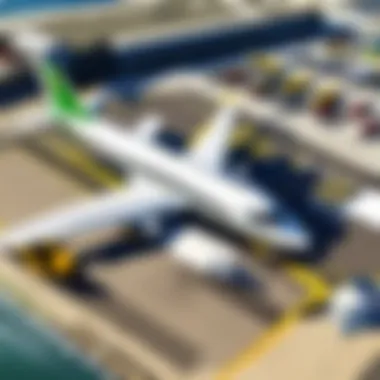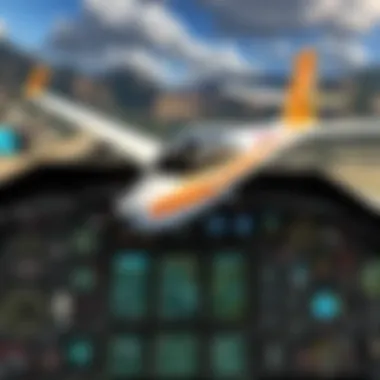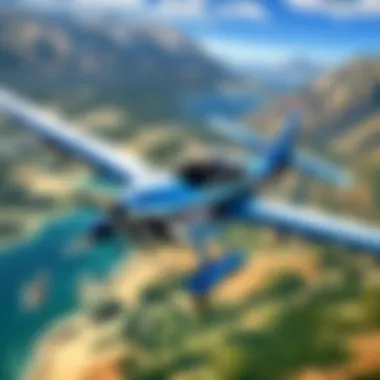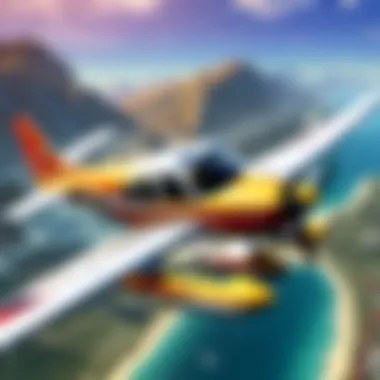Embark on a Virtual Aviation Journey with FSX Flight Simulation Software


History of FSX
FSX, short for Flight Simulator X, is an iconic software that immerses users in the intricate world of flight simulation. It has a rich history, tracing back to its initial development and subsequent evolution through various versions and updates. The software has redefined virtual flying experiences by offering realistic aircraft controls, detailed sceneries, and a thriving community of enthusiasts who continuously enhance the simulation's features.
Features of FSX
One of the key attractions of FSX is its attention to detail, replicating aircraft controls to provide users with a lifelike flying experience. Additionally, the software boasts a wide range of intricate sceneries, allowing virtual pilots to explore various landscapes with stunning realism. Moreover, FSX offers a platform for enthusiasts to create and share add-ons, further enriching the simulation with new features and enhancements.
Community Engagement
Beyond its technical features, FSX fosters a vibrant community of passionate aviators and simulation enthusiasts. This community serves as a hub for sharing experiences, collaborating on projects, and providing support for fellow users. Through forums, online groups, and virtual events, FSX users can connect with like-minded individuals, exchange knowledge, and enhance their virtual flying skills.
Add-Ons for Enhanced Experience
The world of FSX is constantly evolving with the contribution of add-on developers who create new aircraft models, sceneries, and utilities to augment the simulation. These add-ons range from ultra-realistic aircraft replicas to detailed airports and landscapes, offering users the opportunity to customize their experience and explore a vast array of virtual aviation possibilities.
Conclusion
Introduction to FSX Flight Simulation
In this article, the vital exploration of FSX Flight Simulation unfolds, offering a comprehensive view of the intricate virtual flying realm accessible through FSX software. This section serves as the gateway to the immersive and engaging world of flight simulation, highlighting the features, benefits, and considerations essential to understand before delving deeper into the realm of FSX.
Understanding Flight Simulation
Definition of Flight Simulation
Within the context of aviation enthusiasts and simulation aficionados, the definition of flight simulation stands as a pivotal element. Flight simulation replicates the experience of flying aircraft in a controlled and simulated environment, offering enthusiasts a realistic and engaging virtual flying experience. The appeal of flight simulation lies in its ability to provide an authentic flight experience and to cultivate a deeper understanding of aircraft operations and maneuvers. The intricate detail and realism of flight simulation contribute significantly to the overall allure of virtual flying adventures, making it a popular choice among aviation enthusiasts.
Evolution of Flight Simulation Software
The evolution of flight simulation software traces a remarkable journey marked by significant advancements in technology and realism. Over the years, flight simulation software has evolved from basic, rudimentary systems to sophisticated and lifelike platforms that mirror real-world aviation scenarios. The continuous evolution of flight simulation software has resulted in enhanced graphics, improved physics engines, and expanded features, offering users a seamless and immersive virtual flying experience. While the evolution of flight simulation software has brought about numerous advantages such as increased realism and enhanced user experience, it also poses challenges related to system requirements and complexity for users to navigate effectively.
FSX: Microsoft's Flight Simulator
Overview of FSX Features
Microsoft's Flight Simulator X (FSX) stands as a pinnacle in the realm of flight simulation, offering a plethora of features and functionalities that enrich the virtual flying experience. FSX boasts a comprehensive range of aircraft models, detailed scenery, weather dynamics, and realistic physics, providing users with a truly immersive flight simulation experience. The meticulous attention to detail and the vast array of features in FSX set it apart as a preferred choice for aviation enthusiasts seeking a sophisticated and engaging virtual flying platform.
Development and History of FSX
The development and history of FSX shed light on the evolution of Microsoft's flagship flight simulation software. With a rich developmental history spanning various iterations and updates, FSX has emerged as a benchmark in the aviation simulation industry. The robust development process behind FSX has led to continual improvements, enhanced features, and a devoted community of users who actively contribute to the growth and refinement of the software. Understanding the development and history of FSX is essential for enthusiasts looking to grasp the intricacies and advancements that have shaped this iconic flight simulation platform.
Compatibility and System Requirements


Navigating the compatibility and system requirements of FSX is crucial for users seeking to optimize their virtual flying experience. FSX's compatibility with different operating systems, hardware configurations, and peripheral devices plays a significant role in ensuring seamless functionality and performance. By examining the system requirements and compatibility aspects of FSX, users can make informed decisions regarding hardware upgrades, software installations, and system tweaks to enhance the overall usability and performance of the flight simulation software.
Getting Started with FSX
In this segment, we initiate our journey into the captivating realm of FSX by comprehensively exploring how to commence with this advanced flight simulation software. It acts as the fundamental building block laying the groundwork for a fulfilling virtual flying experience. Understanding the core aspects of getting started with FSX is crucial for enthusiasts to navigate its extensive features with ease and precision.
Installation and Setup
Installing FSX Software
When delving into the installation process of FSX software, it is imperative to grasp the meticulous steps involved in setting up this intricate program. Installing FSX integrates the software seamlessly into your system, ensuring a smooth and efficient running of the simulation. This procedure is paramount as it forms the basis for the entirety of the virtual flight experience, laying a solid foundation for future interactions within the program.
Configuring Graphics and Controls
Configuring graphics and controls within FSX plays a pivotal role in enhancing the visual and operational quality of the simulation. By adjusting graphics settings and fine-tuning control mechanisms, users can tailor their experience to meet specific preferences and requirements. This customization aspect not only optimizes the visual appeal of the simulation but also ensures that users have a responsive and personalized interaction with the software.
Basic Controls and Navigation
Aircraft Controls
Mastering aircraft controls within FSX is crucial for achieving a realistic and immersive flight experience. Understanding the nuances of controlling different aircraft models adds depth to the simulation, allowing users to maneuver through virtual skies with precision and accuracy. Aircraft controls form the backbone of the flight simulation, enabling users to simulate authentic flying scenarios and challenges.
Navigating in FSX World
Navigating through the vast world of FSX requires a comprehensive understanding of the simulation's geography and navigation tools. By familiarizing oneself with the intricacies of the FSX world, users can explore diverse landscapes and climates with ease. Navigating in FSX world opens up a plethora of virtual destinations and challenges, enriching the overall flight simulation experience.
Training and Tutorials
Flight Lessons
Embarking on flight lessons within FSX offers users invaluable insights into piloting techniques and procedures. These structured lessons guide users through fundamental flying skills, enabling them to grasp the core principles of aviation within a simulated environment. Flight lessons serve as the stepping stone for users to hone their piloting abilities and enhance their proficiency within the virtual skies.
Guided Tutorials
Engaging with guided tutorials in FSX provides users with hands-on training and practical knowledge about the simulation's features and functions. These tutorials are designed to acquaint users with the various tools and capabilities of FSX, offering step-by-step instructions for honing both basic and advanced flying skills. Guided tutorials serve as a resourceful learning platform, empowering users to explore and exploit the full potential of FSX.
Exploring FSX Features and Add-Ons
Exploring FSX Features and Add-Ons in this article provides an in-depth look at the additional elements that enhance the virtual flying experience in FSX. These features play a crucial role in immersing users in a realistic aviation environment and expanding the simulation beyond standard settings. By delving into the various add-ons available for FSX, users can personalize their flight simulation experience according to their preferences and interests, thus creating a more engaging and tailored virtual world.
Aircraft and Scenery
Available Aircraft Models


Available Aircraft Models offer a diverse range of choices for virtual pilots looking to explore different flying experiences. These models vary in complexity, size, and performance, catering to both novice and seasoned players. The selection of aircraft models adds realism to the simulation, allowing users to experiment with various aircraft types and experience unique flight characteristics. Understanding the nuances of each model enhances the overall flight simulation experience, providing a deeper appreciation for the intricacies of aviation.
Scenery Realism and Diversity
The Scenery Realism and Diversity in FSX play a pivotal role in creating a visually captivating and dynamic virtual world for pilots to navigate through. Realistic scenery settings mimic actual geographical locations, enhancing the immersion and sense of presence within the simulated environment. The diversity of scenery options, ranging from bustling cities to serene landscapes, offers a wide array of visual experiences to users. While realistic scenery adds authenticity to the flight simulation, it also places demands on system resources, requiring a balance between visual quality and performance optimization.
Weather and Time Management
Dynamic Weather System
The Dynamic Weather System feature introduces real-time weather conditions into the simulation, mimicking the unpredictability and challenges that pilots face in actual flights. This dynamic element adds an element of realism and complexity to virtual flying scenarios, requiring pilots to adapt to changing weather patterns and make decisions based on weather forecasts. The interactive nature of the dynamic weather system creates a more engaging and dynamic environment for users, offering a simulation experience that mirrors real-world aviation challenges.
Time of Day Settings
Time of Day Settings in FSX allow users to control the virtual lighting conditions, creating different atmospheres and visual aesthetics for their flights. By adjusting the time of day, pilots can experience flights in various lighting conditions, from the tranquility of sunrise to the mystique of twilight. These settings not only enhance the visual appeal of the simulation but also influence the visibility and navigation aspects of the virtual flying experience, challenging pilots to adapt to changing light conditions.
Community and Multiplayer
Online Community Forums
Online Community Forums serve as hubs for FSX enthusiasts to connect, share experiences, and seek advice from fellow virtual pilots. These forums foster a sense of community among users, allowing them to exchange tips, tricks, and insights regarding FSX gameplay and simulation. Engaging with the online community provides an opportunity for pilots to expand their knowledge, discover new add-ons, and participate in group activities or challenges, enhancing the overall social aspect of the flight simulation experience.
Multiplayer Flying
Multiplayer Flying introduces a collaborative element to virtual aviation, enabling pilots to fly together in shared airspace and engage in group flights or virtual airshows. This feature encourages teamwork, communication, and coordination among players, fostering a sense of camaraderie and competition within the FSX community. Piloting alongside others enhances the realism of the simulation, immersing users in a dynamic and interactive virtual aviation environment where they can learn from one another, showcase their skills, and participate in collective aviation experiences.
Mastering FSX Advanced Features
In the vast realm of flight simulation with FSX software, mastering advanced features is paramount to enhancing the virtual pilot experience. From intricate flight planning to precise aircraft management, delving into advanced features offers enthusiasts a deeper understanding of virtual aviation. By fine-tuning skills in areas such as flight planning, fuel management, and customization, virtual pilots can elevate their simulation proficiency and fully immerse themselves in the dynamic world of FSX.
Flight Planning and Management
Creating Flight Plans
Creating detailed flight plans is a crucial aspect of mastering FSX advanced features, allowing virtual pilots to simulate diverse and challenging scenarios. The precision required in charting routes, selecting waypoints, and optimizing fuel consumption ensures a realistic and engaging flight experience. Understanding the nuances of creating flight plans is instrumental in improving navigation skills and testing pilot expertise within the simulated environment.
Fuel Management
Effective fuel management stands as a key pillar in mastering FSX advanced features, impacting aircraft performance and endurance during virtual flights. Balancing fuel load, monitoring consumption rates, and making strategic refueling decisions influence the outcome of each flight. Adequate fuel management not only enhances realism but also presents virtual pilots with scenarios that mirror real-world aviation challenges, adding depth and complexity to the simulation experience.
Advanced Controls and Instruments
Autopilot Systems


The integration of sophisticated autopilot systems in FSX offers virtual pilots unparalleled control over aircraft navigation and stability. Autopilot systems automate various flight functions, including altitude control, heading adjustments, and route tracking, streamlining the piloting process. Mastering autopilot systems empowers virtual pilots to focus on other critical aspects of flight simulation, such as communication with air traffic control and weather monitoring, enhancing overall efficiency and accuracy.
Radio Navigation
Radio navigation mechanisms play a pivotal role in guiding virtual pilots through intricate flight paths and challenging weather conditions in FSX. Leveraging radio navigation aids, such as VOR (VHF omnidirectional range) and NDB (non-directional beacon), enables precise course corrections and approach maneuvers. Understanding the nuances of radio navigation enhances situational awareness, navigation accuracy, and overall flight safety, making it a cornerstone skill for virtual aviators seeking to master FSX advanced features.
Customization and Mods
Modding Community
Engaging with the thriving modding community of FSX introduces virtual pilots to a wealth of custom modifications and enhancements, elevating the simulation experience to new heights. From aircraft liveries and cockpit designs to scenery enhancements and weather modifications, the modding community fuels creativity and personalization within the FSX ecosystem. By exploring and incorporating mods, virtual pilots can tailor their simulation environment to suit their preferences, fostering innovation and continual evolution within the virtual aviation community.
Custom Aircraft Liveries
Custom aircraft liveries offer virtual pilots the opportunity to personalize their fleet of aircraft, showcasing unique designs and branding within the FSX simulation. Whether replicating real-world liveries or crafting original custom artworks, custom liveries add a touch of individuality to virtual flights. Beyond aesthetic appeal, custom liveries contribute to immersion and realism, enhancing the visual experience for virtual pilots and fostering a sense of ownership and identity within the virtual aviation landscape.
Tips and Tricks for FSX Enthusiasts
In the realm of flight simulation, mastering tips and tricks is a crucial element for enthusiasts to enhance their FSX experience. These insights offer valuable guidance on optimizing performance, enhancing realism, and engaging with virtual airlines efficiently. They serve as a treasure trove of knowledge, allowing enthusiasts to elevate their skills and delve deeper into the intricacies of virtual flight.
Optimizing Performance
Graphics Settings
Graphics settings play a pivotal role in enhancing the visual quality of FSX gameplay. By customizing graphics settings, players can tailor their experience to meet their preferences in terms of visual fidelity and performance. The key characteristic of graphics settings lies in their ability to balance a realistic gaming environment with smooth gameplay. This feature is highly sought after as it provides players with the flexibility to adjust visual elements according to their system specifications and personal preferences. One unique aspect of graphics settings is the level of detail control they offer, allowing players to fine-tune the graphics to achieve optimal performance without compromising visual quality.
Performance Tweaks
Performance tweaks are a set of adjustments aimed at optimizing FSX's performance on a variety of hardware setups. These tweaks can significantly improve the game's frame rate, loading times, and overall smoothness of gameplay. The key characteristic of performance tweaks is their ability to unlock the full potential of FSX, even on less powerful systems. This feature is popular among players looking to maximize their simulation experience without upgrading their hardware. One unique feature of performance tweaks is their versatility; they offer a range of customizable options that can be adjusted based on individual system capabilities and user preferences.
Enhancing Realism
Add-On Aircraft Recommendations
Add-on aircraft recommendations bring a new level of realism and variety to the FSX experience. These additional aircraft models expand the player's virtual hangar with a wide selection of meticulously crafted planes from different eras and manufacturers. The key characteristic of add-on aircraft recommendations is their ability to introduce diversity and authenticity to the simulation, catering to various aviation preferences. This feature is beneficial for players seeking to expand their virtual fleet with high-quality, detailed aircraft models. One advantage of add-on aircraft recommendations is the level of detail and accuracy they offer, enhancing the overall immersive experience for players seeking realism in their virtual flights.
Realistic Scenery Enhancements
Realistic scenery enhancements transform the virtual world of FSX into a visually stunning and realistic landscape. These enhancements include detailed terrain textures, enhanced lighting effects, and realistic environmental elements that bring the simulation to life. The key characteristic of realistic scenery enhancements is their impact on creating an immersive and captivating environment for virtual pilots. This feature is popular among players looking to elevate their visual experience and explore diverse, lifelike landscapes during their virtual flights. One unique feature of realistic scenery enhancements is their attention to detail, replicating real-world locations with accuracy and precision to offer players a truly immersive flying experience.
Joining Virtual Airlines
Virtual Airline Networks
Virtual airline networks provide a platform for FSX enthusiasts to engage with like-minded individuals, participate in group flights, and simulate real-world airline operations. These networks offer a sense of community, allowing players to connect, collaborate, and enjoy shared aviation experiences. The key characteristic of virtual airline networks is their focus on realism and professionalism in virtual flight operations, mirroring the structures and protocols of real airlines. This feature is beneficial for players seeking a more structured and collaborative experience within the FSX community. One advantage of virtual airline networks is the opportunity for players to enhance their piloting skills, interact with experienced virtual aviators, and participate in organized events that simulate real-world aviation scenarios.
Pilot Ranking Systems
Pilot ranking systems provide a competitive element to virtual aviation, allowing players to track their progress, skills, and achievements within the FSX community. These systems assign ranks or ratings based on various performance metrics, such as flight efficiency, adherence to procedures, and successful missions. The key characteristic of pilot ranking systems is their ability to motivate and challenge players to improve their flying skills and aim for higher ranks within the virtual aviation community. This feature is popular among players seeking recognition for their piloting abilities and looking to compete in friendly virtual competitions. One unique feature of pilot ranking systems is the feedback and guidance they provide, helping players assess their strengths and weaknesses, set goals for improvement, and progress through the ranks to become top virtual aviators.



